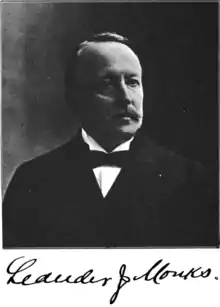Leander Monks
Leander John Monks (July 10, 1843 – April 19, 1919) was a Justice of the Indiana Supreme Court from January 7, 1895 to January 7, 1913.

Early life and education
Born in Winchester, Randolph County, Indiana, Monks was educated in the common schools,[1] and attended Indiana University from 1861 to 1863, gaining admission to the bar in Indiana in 1865,[2] and entering the practice of law in 1866.[1]
Legal and political career
Monks practiced with various attorneys, and, developing a fondness for politics, was made county chairman of the Republican Party, serving in that capacity through the campaigns of 1870 and 1872. He became a member of the Republican State Committee and the Executive Committee in 1874. He served on these committees during the campaigns of 1874 and 1876, resigning from them to become a candidate for circuit judge in 1878.[1]
He was elected as a circuit judge, and was twice re-elected, in 1884 and 1890. He served his first two terms as judge of the Twenty-fifth Judicial Circuit, consisting of Randolph and Delaware counties. Before the beginning of his third term the circuit was divided, and in 1890 he was elected judge of a circuit consisting of Randolph county alone.[1] In 1894, he was elected to the Indiana Supreme Court.[1][2]
Monks wrote a number of noted opinions. In Pomeroy v. Beach,[3] he wrote an opinion construing the garnishee law of 1897 to require the filing of an affidavit in attachment before a writ of garnishment could issue. In Board of Commissioners v. Allman,[4] he wrote an opinion overruling a large number of earlier decisions to the effect that counties are liable for injuries caused by detective bridges. In Baton v. Thomas,[5] he wrote an opinion holding that usurious interest may be recovered back. In Louisville, N. A. & C. Railway Co. v. Bates,[6] he wrote an opinion holding that a railroad company is bound to inspect foreign cars received from other roads in the ordinary course of business, before setting its own servants at work operating them.[1]
In 1899, the Indiana State Bar Association's Indiana Law Journal said of Monks:
Judge Monks is very pleasant, and fond of a good joke. While his bearing is dignified, he is as approachable when holding the position of Chief Justice as he may be presumed to have been when he was a young lawyer seeking clients. As a member of the Supreme Court he is noted for the clearness and brevity of his opinions, usually contenting himself with stating the conclusion reached on a controverted point, with the reasons and authorities which support his conclusion, without entering into an extended discussion of the subject.[1]
After leaving the bench, Monks returned to the practice of law in Indianapolis, and wrote the well-regarded book, Courts and Lawyers of Indiana.[2] Monks died in Indianapolis.[2]
References
- "The Supreme Court", Indiana Law Journal, Vol. III, No. 2 (February 1899), p. 47-49.
- Minde C. Browning, Richard Humphrey, and Bruce Kleinschmidt, "Biographical Sketches of Indiana Supreme Court Justices", Indiana Law Review, Vol. 30, No. 1 (1997), section reproduced in Indiana Courts Justice Biographies page.
- Pomeroy v. Beach, 149 Ind. 511, 49 N.E. 370 (1898).
- Board of Commissioners v. Allman, 142 Ind. 573, 42 N. E. 206 (1895).
- Baton v. Thomas, 150 Ind. —
- Louisville, N. A. & C. Railway Co. v. Bates, 146 Ind. 564, 45 N. E. 108 (1896).
| Political offices | ||
|---|---|---|
| Preceded by Joseph S. Dailey |
Justice of the Indiana Supreme Court 1895–1913 |
Succeeded by Richard K. Erwin |